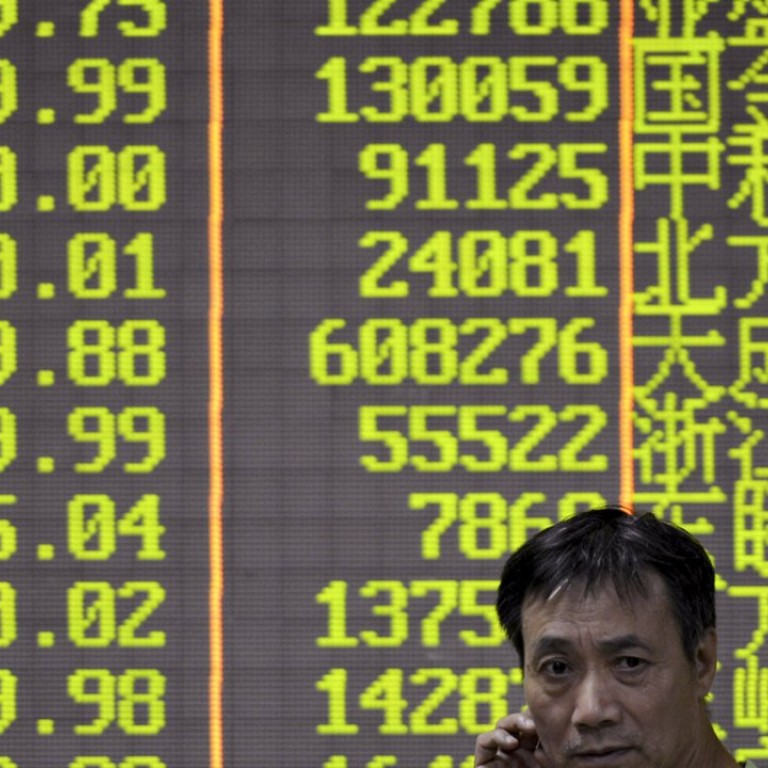
New | China’s plans to restart IPOs adds up to opportunity and fresh risk for investors, analysts say
Brokerage and other financial companies are potential beneficiaries as China moves to restart stock market listings
Some investment advisors are seeing better times ahead for mainland securities companies, financial companies, and other under valued high-quality companies as China gives the green light to new stock market listing activities after a four-month ban.
Last week’s decision by the China Securities and Regulatory Commission to allow a resumption of IPOs signals Beijing’s growing confidence that markets may have finally stabilised after its unprecedented rescue efforts in response to the market meltdown that started in early summer.
“The restart of the IPO market will boost the investment banking business for securities firms,” Qi Ruijuan and Liu Xiangning, analysts for Shanghai-listed Dongxing Securities, said in a recent report.
Meantime, margin loans have increased, suggesting the process of deleveraging in A-shares may have come to an end since the summer crash, they added.
They recommend securities firms with relatively bigger market shares in margin finance or investment banking business, like GF Securities, or enterprises with a competitive edge in stock brokerage services, such as Huatai Securities.
Essence Securities also see undervalued blue-chips as potential beneficiaries from the policy change.
Analysts from the Shenzhen-based brokerage firm suggest investors pay close attention to those blue-chip stocks with “solid company performance” but lower valuations, including state-owned Chinese liquor makers, such as Kweichow Moutai Co. and Luzhou Laojiao, and top meat processor Shanghai Maling Aquarius, which could benefit from China’s “growing demand of top-grade beef”.
Chinese stocks have been volatile this year, as the benchmark soared 60 per cent to a seven-year high in mid-June before crashing 43 per cent in the following two months.
By Thursday, the Shanghai Composite Index had rebounded 20 per cent from its August 26 trough of 2,927.29, technically entering bull market territory. It jumped further in the following two trading sessions, closing at 3,648.42 on Monday, its highest settlement in two and half months. Stock trading volumes also spiked, with the combined daily turnover for Shanghai and Shenzhen hitting 1.37 trillion yuan on Monday, up 17 per cent from the Friday’s session.
Improving market sentiment has led regulators to reopen the listing process to allow Chinese companies to tap primary markets for funding and let private equity enterprises exit and reinvest their capital.
Late Friday, the CSRC announced that it would resume new stock market listings, allowing an initial batch of 28 companies to go public by year-end, and improve the listing system procedures.
However, some analysts worry the recent rebound in stocks may be cut short as the resumption of IPOs puts a liquidity strain on small and medium-sized companies and that have “inflated valuations”, according to Zhang Pin, an analyst for mainland-based Vanho Securities.
Investors setting aside capital to subscribe to new share offerings can drain huge amounts of money from the market in the short term, adding up to volatile conditions when stocks are shaky, Zhang said.
What’s equally important, as the ban on IPOs has been lifted, “it would be hardly justifiable” for Beijing to still keep another ban after January 8, 2016 to bar shareholders with more than 5 per cent stakes from selling stocks, as Beijing imposed the ban in early July “for the next six months” to curb the market slide, Zhang said.
With the benchmark index hovering around 3,600 points, many major shareholders may have a “strong desire to cash out their stocks”, he added.
Zhang advised investors to scale back their positions for the time being, while watching for possible buying opportunities when markets pull back.

